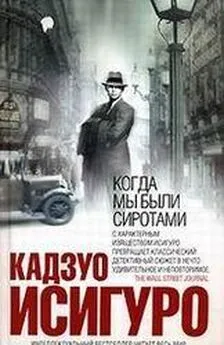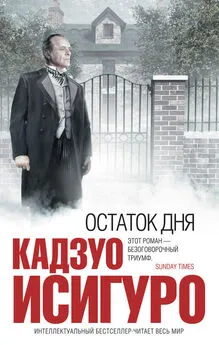Кадзуо Исигуро - Остаток дня / The Remains of the Day
- Название:Остаток дня / The Remains of the Day
- Автор:
- Жанр:
- Издательство:неизвестно
- Год:2020
- Город:Москва
- ISBN:978-5-04-112761-9
- Рейтинг:
- Избранное:Добавить в избранное
-
Отзывы:
-
Ваша оценка:
Кадзуо Исигуро - Остаток дня / The Remains of the Day краткое содержание
«Остаток дня» – дневник дворецкого, жизнь с точки зрения Бэрримора. В основе его стилистики лежит сдержанность, выявляющая себя в самой механике речи. Герой не считает возможным проявлять свои чувства, и на лингвистическом уровне эта своеобразная аскеза приводит к замечательным результатам – перед нами этакая оборотная сторона Достоевского с его неуправляемым потоком эмоций.
В 1989 году за «Остаток дня» Исигуро единогласно получил Букера (и это было, пожалуй, единственное решение Букеровского комитета за всю историю премии, ни у кого не вызвавшее протеста). Одноименная экранизация Джеймса Айвори с Энтони Хопкинсом в главной роли пользовалась большим успехом.
А Борис Акунин написал своего рода римейк «Остатка дня» – роман «Коронация».
В формате a4-pdf сохранен издательский макет книги.
Остаток дня / The Remains of the Day - читать онлайн бесплатно ознакомительный отрывок
Интервал:
Закладка:
Herr Bremann first visited Darlington Hall very shortly after the war while still in his officer’s uniform, and it was evident to any observer that he and Lord Darlington had struck up a close friendship. This did not surprise me, since one could see at a glance that Herr Bremann was a gentleman of great decency. He returned again, having left the German army, at fairly regular intervals during the following two years, and one could not help noticing with some alarm the deterioration he underwent from one visit to the next. His clothes became increasingly impoverished, his frame thinner; a hunted look appeared in his eyes, and on his last visits, he would spend long periods staring into space, oblivious of his lordship’s presence or, sometimes, even of having been addressed. I would have concluded Herr Bremann was suffering from some serious illness, but for certain remarks his lordship made at that time assuring me this was not so.
It must have been towards the end of 1920 that Lord Darlington made the first of a number of trips to Berlin himself, and I can remember the profound effect it had on him. A heavy air of preoccupation hung over him for days after his return, and I recall once, in reply to my inquiring how he had enjoyed his trip, his remarking:
‘Disturbing, Stevens. Deeply disturbing. It does us great discredit to treat a defeated foe like this. A complete break with the traditions of this country.’
But there is another memory that has remained with me very vividly in relation to this matter. Today, the old banqueting hall no longer contains a table and that spacious room, with its high and magnificent ceiling, serves Mr Farraday well as a sort of gallery. But in his lordship’s day, that room was regularly required, as was the long table that occupied it, to seat thirty or more guests for dinner; in fact, the banqueting hall is so spacious that when necessity demanded it, further tables were added to the existing one to enable almost fifty to be seated. On normal days, of course, Lord Darlington took his meals, as does Mr Farraday today, in the more intimate atmosphere of the dining room, which is ideal for accommodating up to a dozen. But on that particular winter’s night I am recollecting the dining room was for some reason out of use, and Lord Darlington was dining with a solitary guest – I believe it was Sir Richard Fox, a colleague from his lordship’s Foreign Office days – in the vastness of the banqueting hall. You will no doubt agree that the hardest of situations as regards dinner-waiting is when there are just two diners present. I would myself much prefer to wait on just one diner, even if he were a total stranger. It is when there are two diners present, even when one of them is one’s own employer, that one finds it most difficult to achieve that balance between attentiveness and the illusion of absence that is essential to good waiting; it is in this situation that one is rarely free of the suspicion that one’s presence is inhibiting the conversation.
On that occasion, much of the room was in darkness, and the two gentlemen were sitting side by side midway down the table – it being much too broad to allow them to sit facing one another – within the pool of light cast by the candles on the table and the crackling hearth opposite. I decided to minimize my presence by standing in the shadows much further away from table than I might usually have done. Of course, this strategy had a distinct disadvantage in that each time I moved towards the light to serve the gentlemen, my advancing footsteps would echo long and loud before I reached the table, drawing attention to my impending arrival in the most ostentatious manner; but it did have the great merit of making my person only partially visible while I remained stationary. And it was as I was standing like that, in the shadows some distance from where the two gentlemen sat amidst those rows of empty chairs, that I heard Lord Darlington talk about Herr Bremann, his voice as calm and gentle as usual, somehow resounding with intensity around those great walls.
‘He was my enemy,’ he was saying, ‘but he always behaved like a gentleman. We treated each other decently over six months of shelling each other. He was a gentleman doing his job and I bore him no malice. I said to him: “Look here, we’re enemies now and I’ll fight you with all I’ve got. But when this wretched business is over, we shan’t have to be enemies any more and we’ll have a drink together.” Wretched thing is, this treaty is making a liar out of me. I mean to say, I told him we wouldn’t be enemies once it was all over. But how can I look him in the face and tell him that’s turned out to be true?’
And it was a little later that same night that his lordship said with some gravity, shaking his head:
‘I fought that war to preserve justice in this world. As far as I understood, I wasn’t taking part in a vendetta against the German race.’
And when today one hears talk about his lordship, when one hears the sort of foolish speculations concerning his motives as one does all too frequently these days, I am pleased to recall the memory of that moment as he spoke those heartfelt words in the near-empty banqueting hall. Whatever complications arose in his lordship’s course over subsequent years, I for one will never doubt that a desire to see ‘justice in this world’ lay at the heart of all his actions.
It was not long after that evening there came the sad news that Herr Bremann had shot himself in a train between Hamburg and Berlin. Naturally, his lordship was greatly distressed and immediately made plans to dispatch funds and commiserations to Frau Bremann. However, after several days of endeavour, in which I myself did my best to assist, his lordship was not able to discover the whereabouts of any of Herr Bremann’s family. He had, it seemed, been homeless for some time and his family dispersed.
It is my belief that even without this tragic news, Lord Darlington would have set upon the course he took; his desire to see an end to injustice and suffering was too deeply ingrained in his nature for him to have done otherwise. As it was, in the weeks that followed Herr Bremann’s death, his lordship began to devote more and more hours to the matter of the crisis in Germany. Powerful and famous gentlemen became regular visitors to the house – including, I remember, figures such as Lord Daniels, Professor Maynard Keynes, and Mr H. G. Wells, the renowned author, as well as others who, because they came ‘off the record’, I should not name here – and they and his lordship were often to be found locked in discussion for hours on end.
Some of the visitors were, in fact, so ‘off the record’ that I was instructed to make sure the staff did not learn their identities, or in some cases, even glimpse them. However – and I say this with some pride and gratitude – Lord Darlington never made any efforts to conceal things from my own eyes and ears; I can recall on numerous occasions, some personage breaking off in mid-sentence to glance warily towards my person, only for his lordship to say:
‘Oh, that’s all right. You can say anything in front of Stevens, I can assure you.’
Steadily, then, over the two years or so following Herr Bremann’s death, his lordship, together with Sir David Cardinal, who became his closest ally during that time, succeeded in gathering together a broad alliance of figures who shared the conviction that the situation in Germany should not be allowed to persist. These were not only Britons and Germans, but also Belgians, French, Italians, Swiss; they were diplomats and political persons of high rank; distinguished clergymen; retired military gentlemen; writers and thinkers. Some were gentlemen who felt strongly, like his lordship himself, that fair play had not been done at Versailles and that it was immoral to go on punishing a nation for a war that was now over. Others, evidently, showed less concern for Germany or her inhabitants, but were of the opinion that the economic chaos of that country, if not halted, might spread with alarming rapidity to the world at large.
By the turn of 1922, his lordship was working with a clear goal in mind. This was to gather under the very roof of Darlington Hall the most influential of the gentlemen whose support had been won with a view to conducting an ‘unofficial’ international conference – a conference that would discuss the means by which the harshest terms of the Versailles treaty could be revised. To be worthwhile, any such conference would have to be of sufficient weight so that it could have a décisive effect on the ‘official’ international conferences – several of which had already taken place with the express purpose of reviewing the treaty, but which had succeeded in producing only confusion and bitterness. Our Prime Minister of that time, Mr Lloyd George, had called for another great conference to be held in Italy in the spring of 1922, and initially his lordship’s aim was to organize a gathering at Darlington Hall with a view to ensuring a satisfactory outcome to this event. For all the hard work on his and Sir David’s part, however, this proved too harsh a deadline; but then with Mr George’s conference ending yet again in indecision, his lordship set his sights on a further great conference scheduled to take place in Switzerland the following year.
I can remember one morning around this time bringing Lord Darlington coffee in the breakfast room, and his saying to me as he folded The Times with some disgust:
‘Frenchmen. Really, I mean to say, Stevens. Frenchmen.’
‘Yes, sir.’
‘And to think we have to be seen by the world to be arm in arm with them. One wishes for a good bath at the mere reminder.’
‘Yes, sir.’
‘Last time I was in Berlin, Stevens, Baron Overath, old friend of my father, came up and said: “Why do you do this to us? Don’t you see we can’t go on like this?” I was jolly well tempted to tell him it’s those wretched Frenchmen. It’s not the English way of carrying on, I wanted to say. But I suppose one can’t do things like that. Mustn’t speak ill of our dear allies.’
But the very fact that the French were the most intransigent as regards releasing Germany from the cruelties of the Versailles treaty made all the more imperative the need to bring to the gathering at Darlington Hall at least one French gentleman with unambiguous influence over his country’s foreign policy. Indeed, I heard several times his lordship express the view that without the participation of such a personage, any discussion on the topic of Germany would be little more than an indulgence. He and Sir David accordingly set upon this final crucial lap of their preparations and to witness the unswerving determination with which they persevered in the face of repeated frustrations was a humbling experience; countless letters and telegrams were dispatched and his lordship himself made three separate trips to Paris within the space of two months. Finally, having secured the agreement of a certain extremely illustrious Frenchman – I will merely call him ‘M. Dupont’ – to attend the gathering on a very strict ‘off the record’ basis, the date for the conference was set. That is to say, for that memorable March of 1923.
As this date grew ever nearer, the pressures on myself, though of an altogether more humble nature than those mounting on his lordship, were nevertheless not inconsequential. I was only too aware of the possibility that if any guest were to find his stay at Darlington Hall less than comfortable, this might have repercussions of unimaginable largeness. Moreover, my planning for the event was complicated by the uncertainty as to the numbers involved. The conference being of a very high level, the participants had been limited to just eighteen very distinguished gentlemen and two ladies – a German countess and the formidable Mrs Eleanor Austin, at that time still resident in Berlin; but each of these might reasonably bring secretaries, valets and interpreters, and there proved no way of ascertaining the precise number of such persons to expect. Furthermore, it became clear that a number of the parties would be arriving some time before the three days set aside for the conference, thus giving themselves time to prepare their ground and gauge the mood of fellow guests, though their exact arrival dates were, again, uncertain. It was clear then that the staff would not only have to work extremely hard, and be at their most alert, they would also have to be, unusually flexible. In fact, I was for some time of the opinion that this huge challenge ahead of us could not be surmounted without my bringing in additional staff from outside. However, this option, quite aside from the misgivings his lordship was bound to have as regards gossip travelling, entailed my having to rely on unknown quantities just when a mistake could prove most costly. I thus set about preparing for the days ahead as, I imagine, a general might prepare for a battle: I devised with utmost care a special staff plan anticipating all sorts of eventualities; I analysed where our weakest points lay and set about making contingency plans to fall back upon in the event of these points giving way; I even gave the staff a military-style ‘pep-talk’, impressing upon them that, for all their having to work at an exhausting rate, they could feel great pride in discharging their duties over the days that lay ahead. ‘History could well be made under this roof,’ I told them. And they, knowing me to be one not prone to exaggerated statements, well understood that something of an extraordinary nature was impending.
Читать дальшеИнтервал:
Закладка:
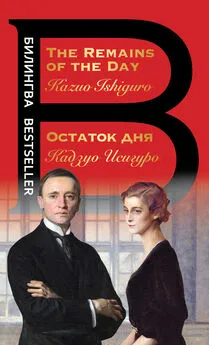
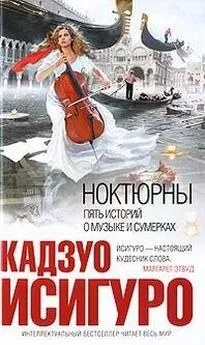

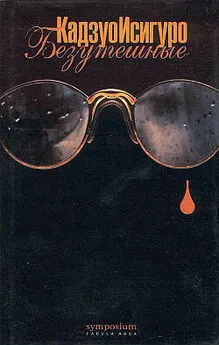

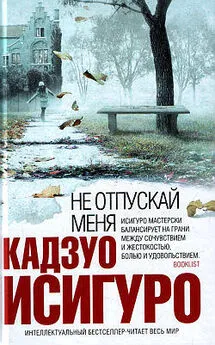
![Кадзуо Исигуро - Не отпускай меня [litres]](/books/1095846/kadzuo-isiguro-ne-otpuskaj-menya-litres.webp)
